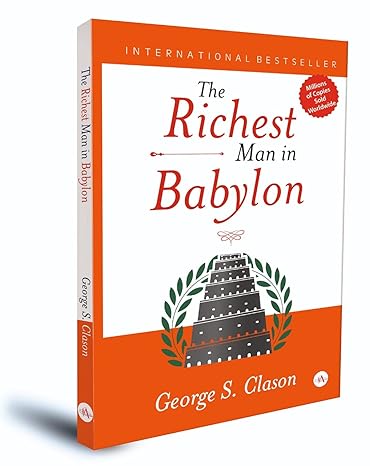The Richest Man In Babylon by George S. Clason
Secure Checkout with Amazon!
- Top-Rated Books
- Readers Satisfaction
- Verified Customer Reviews
Description
The Richest Man in Babylon by George S. Clason is a widely acclaimed book that uses ancient parables to impart timeless lessons on wealth, personal finance, and the principles of financial success. First published in the 1920s, the book’s teachings remain highly relevant today. Set in the prosperous city of Babylon, which was once the richest city in the world, Clason’s stories illustrate the fundamental laws of wealth accumulation and the universal truths of money management.
The book’s central figure, Arkad, is known as the richest man in Babylon. His journey to wealth is at the heart of the book, and through his story, Clason provides readers with key financial principles that anyone can follow. Arkad started as a poor scribe but, through discipline and understanding of financial principles, he became extraordinarily wealthy. When asked how he achieved such success, Arkad shares several key lessons that form the backbone of the book.
One of the primary lessons of the book is the concept of paying yourself first. Arkad emphasizes the importance of saving at least 10% of one’s income before spending on other necessities or luxuries. This habit of consistent saving is portrayed as the foundation for building wealth. By setting aside a portion of earnings for oneself, individuals can accumulate wealth over time, no matter their income level. Clason teaches that money saved today can work for you tomorrow, allowing wealth to grow.
Another key principle in the book is the idea of living below your means. Clason stresses that it is essential not to confuse wealth with high income or extravagant spending. He emphasizes that true financial security comes from managing expenses wisely, living within your means, and resisting the urge to spend all that you earn. Arkad teaches that it is not how much you earn but how much you save and invest that leads to financial success.
In addition to saving and controlling spending, the book provides advice on how to make money work for you through sound investments. Arkad explains that money can be a loyal servant if properly invested, as it will grow and generate income over time. Clason stresses the importance of understanding the risks and rewards of investments, avoiding risky schemes, and seeking advice from those who are knowledgeable in financial matters. The book’s parables demonstrate that wealth can multiply if one invests wisely and is patient with the growth process.
Clason also highlights the dangers of debt, teaching that borrowing money for non-essentials or luxury items can trap people in financial distress. He urges readers to avoid debt when possible and to make a plan to repay debts as quickly as possible if they do arise. In the Babylonian tales, characters who succumb to debt struggle, while those who are disciplined about avoiding it thrive.
The Richest Man in Babylon also emphasizes the importance of learning from mistakes and persistence. Many of the book’s characters face financial setbacks or failures along their journey, but they are encouraged to persevere and learn from their experiences. Arkad, too, did not become wealthy overnight. He acquired his wealth slowly through patience, discipline, and a willingness to learn from failure. Clason’s message is that financial success requires determination and consistency.
Another lesson found in the book is the principle of continuous learning and seeking financial knowledge. Arkad advises people to always be eager to learn about money management and to take advice only from those who are experts in the field. The parable of the camel trader, for example, illustrates that trusting inexperienced people or engaging in speculative ventures can lead to financial losses. Instead, one should seek wise counsel and make informed financial decisions.
Throughout the book, Clason’s use of ancient parables makes the lessons both engaging and relatable. The tales of Babylon serve as a metaphor for the modern world, where people of all walks of life face the same challenges in managing their finances. Clason’s writing emphasizes that the principles of wealth are universal and eternal—whether in ancient Babylon or today, the key to financial success is discipline, careful planning, and making money work for you through sound investment.
The lessons in The Richest Man in Babylon are designed to be practical and accessible for readers of all financial backgrounds. They are not complex strategies requiring specialized knowledge, but rather simple, common-sense habits that, when followed consistently, lead to wealth and financial independence. By incorporating Clason’s principles, readers are encouraged to take control of their finances, build a solid foundation for wealth, and ensure a prosperous future.
Ultimately, The Richest Man in Babylon teaches that wealth is not about luck or extraordinary talent; it is the result of careful planning, smart decision-making, and a disciplined approach to saving and investing. Clason’s timeless financial wisdom continues to inspire readers to take control of their financial lives and pursue long-term prosperity.






Reviews
There are no reviews yet.